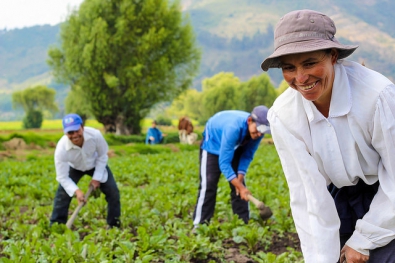Of the 17 Sustainable Development Goals (SDG), 10 establish a direct link with Family Farming, and it’s explicitly mentioned in ODS 2, which stresses the need to end hunger, achieve food security and improved nutrition and promoting sustainable agriculture.
Wednesday 3 August 2016 – Family Farming is in a prominent place on the Sustainable Development Agenda approved by the UN General Assembly in September 2015 which will be the framework for development over the next 15 years. In 10 of the 17 Sustainable Development Goals (SDG’s), the importance of Family Farming is perceived, being in the SDG 2, to eradicate hunger, in which is mentioned more explicitly.
Through the 17 Sustainable Development Goals, the international community has pledged to try to achieve the goal of eradicating hunger and poverty, achieving development for all human beings and doing it sustainably. To do that, family farming will have to be regarded as one of the keystones of such inclusive development.
Practically all the SDGs have an undeniable farming and rural component. The Sustainable Development Goals Agenda represents a more integrated view of development, in which the goals and indicators are interrelated and in which the role of sustainable family farming capable of feeding humankind is undisputed.
Goal 2 – ending hunger – deals with foodstuffs (how they are grown, produced, consumed, traded, transported, stored and marketed) and highlights the fundamental connection between people and planet, signposting the way to sustainable food for all human beings.
Besides de SDG 2, Family Farming also plays a key role in the SDG 1, which refers to end poverty, because to achieve it the focus needs to be on the rural sector, supporting in particular the most important actors for change (family farmers, including small-scale fishers and pastoralists), improving local capacity to produce and gain access to food, and establishing social protection systems.
It is thus ever more necessary for States to implement public policies designed to make family farming a strong and enduring social, economic, environmental and productive sector, of decisive importance for the success of the SDG. This means making a commitment to all types of family farming, to rural families, to indigenous communities, to small-scale fishers and to pastoralists.
FAMILY FARMING HAS A PLACE IN EVERY SDG
As we go through the list of SDGs, we see that many of them refer to the role that family farming must play in achieving them. You can find more detailed information in a paper entitled “Family Farming and the Sustainable Development Agenda”.
Besides of being present in the MDGs 1 and ODS 2, as mentioned above, there is a clear link with the following objectives:
SDG 5: achieving gender equality and empowering women
SDG 6: Availability and sustainable management of water and sanitation
SDG 7: Access to affordable, secure and sustainable energy
SDG 11: Make cities inclusive, safe, resilient and sustainable
SDG 12: ensuring sustainable production and consumption
SDG 13: taking urgent action to combat climate change and its impacts
SDG 14: Conserve and sustainably use the oceans, seas and marine resources
SDG 15: Sustainably manage forests, combat desertification, halt and reverse land degradation, halt biodiversity loss
More information:
- Full report “Family Farming on the Sustainable Development Agenda” (Spanish)



